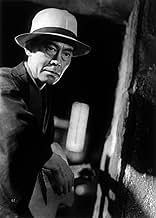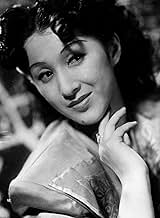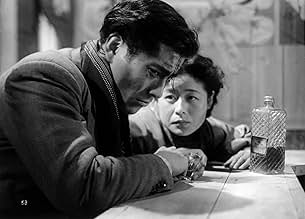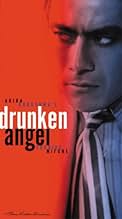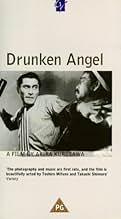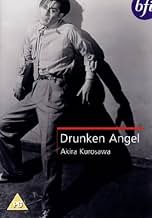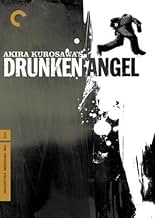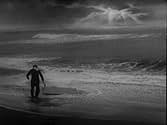CALIFICACIÓN DE IMDb
7.6/10
14 k
TU CALIFICACIÓN
Sanada es un médico con un carácter muy peculiar, que vive atormentado por lo que pudo haber sido su vida. Un día, el doctor recibe a altas horas de la noche a un hombre enfermo de tuberculo... Leer todoSanada es un médico con un carácter muy peculiar, que vive atormentado por lo que pudo haber sido su vida. Un día, el doctor recibe a altas horas de la noche a un hombre enfermo de tuberculosis que le pide que le cure una herida.Sanada es un médico con un carácter muy peculiar, que vive atormentado por lo que pudo haber sido su vida. Un día, el doctor recibe a altas horas de la noche a un hombre enfermo de tuberculosis que le pide que le cure una herida.
- Dirección
- Guionistas
- Elenco
- Premios
- 4 premios ganados en total
Mayuri Mokushô
- Daughter at Flower Shop
- (as Kumiko Mokushô)
- Dirección
- Guionistas
- Todo el elenco y el equipo
- Producción, taquilla y más en IMDbPro
Opiniones destacadas
Drunken Angel returns Toho to their bleak, dark roots and on this occasion it certainly worked no end.
It tells the story of the tremulous relationship between an alcoholic doctor and his violent mafia member patient. The doctor see's his younger self in the Yakuza and set's about going the extra mile to help him despite being fought every stage along the way.
After a series of mediocre Toho films I was already losing faith in the Kurosawa hype, therefore this came as a really pleasant surprise to me.
Powerful, hard hitting and wonderfully constructed Drunken Angel is by far the best Toho movie I've seen thus far.
The Good:
Well written
Some poignant moments
The Bad:
Things I Learnt From This Movie:
Bullets come out of a persons body in the same condition they went in
I'd have let them get typhus......and that's reason no.57579853789 why I should never have kids
It tells the story of the tremulous relationship between an alcoholic doctor and his violent mafia member patient. The doctor see's his younger self in the Yakuza and set's about going the extra mile to help him despite being fought every stage along the way.
After a series of mediocre Toho films I was already losing faith in the Kurosawa hype, therefore this came as a really pleasant surprise to me.
Powerful, hard hitting and wonderfully constructed Drunken Angel is by far the best Toho movie I've seen thus far.
The Good:
Well written
Some poignant moments
The Bad:
Things I Learnt From This Movie:
Bullets come out of a persons body in the same condition they went in
I'd have let them get typhus......and that's reason no.57579853789 why I should never have kids
Kurosawa began his career as a jobbing director, making the pictures the studio wanted him to in conventional, by-the-book style. It was with Drunken Angel, his eighth film, that he turned a corner. He regarded it as the first film that was really his, and typically here combining bold social commentary with tender sympathy towards flawed and downtrodden characters.
This also marks the beginning of one of the greatest actor-director relationships in the history of cinema, with the young Toshiro Mifune making his debut for Kurosawa. It is amazing how naturally talented an actor Mifune was. He already knew exactly how to move in front of the camera, and could convey so much with the tiniest of gestures. However, he doesn't get to show off his full range here. Also, in the leading role, is Kurosawa regular and fantastic character actor Takashi Shimura. There isn't really one bad performance in the whole thing.
Drunken Angel is essentially a lament for the state of post-war Japanese society. Not only does the story concern the victims of that era, it is also an extended allegory using illness and contamination as a metaphor for the state of the nation. The central characters a tubercular gangster (Mifune) and an alcoholic doctor (Shimura) are partly to blame for their own conditions, and while they want to get better haven't the willpower to do so. The pond of stagnant water outside the doctor's surgery, a constantly recurring image of despair, seems to be the result of a bomb crater from the war.
The plot structure is episodic and bitty, somewhat reminiscent of neo-realist cinema. Unfortunately this makes the whole thing a bit lacking in pace and even boring in places. Things really start to pick up in the second half of the film when the plot starts to come together. The introduction of Okada, a gangland boss who has just finished a stint in prison, adds an element of danger to what has so far only been a gloomy drama.
Music is a constant presence in Drunken Angel, with diagetic music (i.e. really there in the scene rather than a background score) being used to give atmosphere and introduce characters. A whole variety of tunes are heard blasting from bars and dance halls, but most memorable of all is a man who sits outside the surgery playing a dismal Japanese folk melody on an acoustic guitar. This acts like a theme tune for the doctor. However, when Okada appears he takes the guitar and announces his presence by playing a doom-laden classical piece. This seems to have been a major influence on Sergio Leone, particularly on the character of Harmonica in his Once Upon a Time in the West (1968).
It is in the final act of this picture that Kurosawa reveals his talent for deeply sentimental and emotional direction. I won't reveal exactly what happens, but as the film looks set to reach a tense finale (in what is the only proper action sequence) Kurosawa turns it on its head, using expert timing, camera-work, cross-cutting and Fumio Hayasaka's score to produce a scene of incredible poignancy. Another Kurosawa trademark which is established here was his way of injecting a little note of hope into the ending of his darker pessimistic pictures, with the final scene suggesting there may be a cure for this sick society.
Despite all these developments in Kurosawa's style, he was not quite yet ready to turn out a masterpiece. In some ways he seems to have simply crammed every idea he had at the time into the 95 minutes. There is even a dream sequence in which Mifune smashes open a coffin is chased by a zombie version of himself. This hints towards Kurosawa's later horror-tinged work and a similar but better done scene in Kagemusha (1980), but here it seems a little clichéd and very much at odds with the overall tone of the film. Drunken Angel has its moments and is packed with good elements, which is why I rate it as highly as I do, but as a whole it doesn't come together enough to really suck the viewer in.
This also marks the beginning of one of the greatest actor-director relationships in the history of cinema, with the young Toshiro Mifune making his debut for Kurosawa. It is amazing how naturally talented an actor Mifune was. He already knew exactly how to move in front of the camera, and could convey so much with the tiniest of gestures. However, he doesn't get to show off his full range here. Also, in the leading role, is Kurosawa regular and fantastic character actor Takashi Shimura. There isn't really one bad performance in the whole thing.
Drunken Angel is essentially a lament for the state of post-war Japanese society. Not only does the story concern the victims of that era, it is also an extended allegory using illness and contamination as a metaphor for the state of the nation. The central characters a tubercular gangster (Mifune) and an alcoholic doctor (Shimura) are partly to blame for their own conditions, and while they want to get better haven't the willpower to do so. The pond of stagnant water outside the doctor's surgery, a constantly recurring image of despair, seems to be the result of a bomb crater from the war.
The plot structure is episodic and bitty, somewhat reminiscent of neo-realist cinema. Unfortunately this makes the whole thing a bit lacking in pace and even boring in places. Things really start to pick up in the second half of the film when the plot starts to come together. The introduction of Okada, a gangland boss who has just finished a stint in prison, adds an element of danger to what has so far only been a gloomy drama.
Music is a constant presence in Drunken Angel, with diagetic music (i.e. really there in the scene rather than a background score) being used to give atmosphere and introduce characters. A whole variety of tunes are heard blasting from bars and dance halls, but most memorable of all is a man who sits outside the surgery playing a dismal Japanese folk melody on an acoustic guitar. This acts like a theme tune for the doctor. However, when Okada appears he takes the guitar and announces his presence by playing a doom-laden classical piece. This seems to have been a major influence on Sergio Leone, particularly on the character of Harmonica in his Once Upon a Time in the West (1968).
It is in the final act of this picture that Kurosawa reveals his talent for deeply sentimental and emotional direction. I won't reveal exactly what happens, but as the film looks set to reach a tense finale (in what is the only proper action sequence) Kurosawa turns it on its head, using expert timing, camera-work, cross-cutting and Fumio Hayasaka's score to produce a scene of incredible poignancy. Another Kurosawa trademark which is established here was his way of injecting a little note of hope into the ending of his darker pessimistic pictures, with the final scene suggesting there may be a cure for this sick society.
Despite all these developments in Kurosawa's style, he was not quite yet ready to turn out a masterpiece. In some ways he seems to have simply crammed every idea he had at the time into the 95 minutes. There is even a dream sequence in which Mifune smashes open a coffin is chased by a zombie version of himself. This hints towards Kurosawa's later horror-tinged work and a similar but better done scene in Kagemusha (1980), but here it seems a little clichéd and very much at odds with the overall tone of the film. Drunken Angel has its moments and is packed with good elements, which is why I rate it as highly as I do, but as a whole it doesn't come together enough to really suck the viewer in.
This is a strange film about a very committed but screwed up doctor in post-war Japan. The doctor lives in the slums of Tokyo and is amazed at the filth and widespread incidence of preventable diseases among the poor. While this is an important cause to him, so is getting drunk and screwing up his life. However, the doctor meets a young hoodlum, played by Toshiro Mifune, and he treats him even when the guy insists everything is just fine! And, at times afterwards, Mifune alternates from being thankful and decent to being belligerent and completely antisocial. Throughout the film, the doctor works hard to keep this unlikable character alive--despite it seeming pretty obvious that Mifune has a death wish. A fascinating and odd story about the relationship between two very oddly matched men.
I loved this movie for many reasons:
The film history : it's the first collaboration between Akira Kurosawa (director) and Toshiro Mifune (actor) that continued through 15 more films including the sublime Rashomon, Seven Samurai and Yojimbo.
The style : it's a great film noir with gangsters, zoot suits, speakeasy's, gambling etc.,
The history : post WW II Japan is a frightening place with rubble, raw sewage, crime and hope. It's a world I hadn't seen before.
Toshiro Mifune : What an amazing actor. He oozes charisma and you cannot take your eyes off of him. His performance reminded me of the first time I saw Russell Crowe, in a little seen mediocre movie called "For the Moment" which I watched many times because of Crowe's intensity.
My only problem is the copy I saw was terrible. The print was faded and half of the subtitles were illegible. When will this be released on DVD? It's not Kurosawa's best film, but it's certainly better than most of the drivel out there.
The film history : it's the first collaboration between Akira Kurosawa (director) and Toshiro Mifune (actor) that continued through 15 more films including the sublime Rashomon, Seven Samurai and Yojimbo.
The style : it's a great film noir with gangsters, zoot suits, speakeasy's, gambling etc.,
The history : post WW II Japan is a frightening place with rubble, raw sewage, crime and hope. It's a world I hadn't seen before.
Toshiro Mifune : What an amazing actor. He oozes charisma and you cannot take your eyes off of him. His performance reminded me of the first time I saw Russell Crowe, in a little seen mediocre movie called "For the Moment" which I watched many times because of Crowe's intensity.
My only problem is the copy I saw was terrible. The print was faded and half of the subtitles were illegible. When will this be released on DVD? It's not Kurosawa's best film, but it's certainly better than most of the drivel out there.
Considering this is the first collaboration between one of the 'heavyweight' director/star combos in cinema (tops in the Japanese film world, probably their equal to America's Scorsese/De Niro), this is quite a powerhouse of drama. That's not to say it's a completely dour film- some of Akira Kurosawa's trademark ironic (and subtle) humor is laced into scenes. But more-over, Kurosawa made here an important film for its time. While the team of Kurosawa and Toshiro Mifune would become even more internationally known for the thrilling Japanese mystery Stray Dog, and the masterpiece Rashomon, this film seems to get a little under-looked by Kurosawa fans (at least those that haven't quite dug into the catalog of their work). Is it their very best? Not quite, but it ranks high up there for me.
And it's not just the collaboration of the director and the star- there is also the co-star, Takashi Shimura, who has made his great mark on many of Kurosawa's films (the two I mentioned previous, plus his best role in Ikiru, and Seven Samurai as well). He plays a doctor who can't quite lay off the booze, even as he tries to help the people around him who seem to be contracting all sorts of bad diseases from the contaminated water (most notably tuberculosis). Mifune plays a member of the Yakuza crime gang, but is more of just a low level thug than a real 'somebody'. He's getting signs of TB, and goes to the 'good' doctor, who refuses help to the Yakuza, having outright contempt for them. Through the course of the film, The two actors portray these people as fragile, intense, hostile, compassionate, and with all the great emotional impact that comes in Japanese dramas.
While one might want to check this out for the context of the Yakuza part of the plot (which was one reason I wanted to check it out- not the Yakuza in today's Japanese cinema of course), the side that Kurosawa shows wonderfully in a film like Red Beard is also brought to light here. There's some action, but it gets thrown into a larger, more emotional context as Mifune's character starts to deteriorate. It becomes very theatrical in a sense, but there is also the realism that Kurosawa had on his sleeve, one that he had to express in post-war Japan (many of these post-war images are better expressed in Stray Dog, but he gives some ample time here too in a subtler, more dangerous context). So this mix comes together, and it turns into one hell of a picture. It may feel a little on the weak side compared to some of Kurosawa's magnum opuses (Seven Samurai, Ran, Yojimbo come to mind). Yet it ranks as an important point in the careers of the actors and director, and it contains enough great moments, enough in terms of the position of the camera and the often shattering music, to make it an under-rated (perhaps minor) classic. Personally, I loved it- especially the last twenty minutes.
And it's not just the collaboration of the director and the star- there is also the co-star, Takashi Shimura, who has made his great mark on many of Kurosawa's films (the two I mentioned previous, plus his best role in Ikiru, and Seven Samurai as well). He plays a doctor who can't quite lay off the booze, even as he tries to help the people around him who seem to be contracting all sorts of bad diseases from the contaminated water (most notably tuberculosis). Mifune plays a member of the Yakuza crime gang, but is more of just a low level thug than a real 'somebody'. He's getting signs of TB, and goes to the 'good' doctor, who refuses help to the Yakuza, having outright contempt for them. Through the course of the film, The two actors portray these people as fragile, intense, hostile, compassionate, and with all the great emotional impact that comes in Japanese dramas.
While one might want to check this out for the context of the Yakuza part of the plot (which was one reason I wanted to check it out- not the Yakuza in today's Japanese cinema of course), the side that Kurosawa shows wonderfully in a film like Red Beard is also brought to light here. There's some action, but it gets thrown into a larger, more emotional context as Mifune's character starts to deteriorate. It becomes very theatrical in a sense, but there is also the realism that Kurosawa had on his sleeve, one that he had to express in post-war Japan (many of these post-war images are better expressed in Stray Dog, but he gives some ample time here too in a subtler, more dangerous context). So this mix comes together, and it turns into one hell of a picture. It may feel a little on the weak side compared to some of Kurosawa's magnum opuses (Seven Samurai, Ran, Yojimbo come to mind). Yet it ranks as an important point in the careers of the actors and director, and it contains enough great moments, enough in terms of the position of the camera and the often shattering music, to make it an under-rated (perhaps minor) classic. Personally, I loved it- especially the last twenty minutes.
¿Sabías que…?
- TriviaIn early drafts of the script, the story was almost entirely about Doctor Sanada (Takashi Shimura) and Matsunaga the thug (Toshirô Mifune) was a small supporting part. However, Akira Kurosawa was so impressed with Mifune's performance that he greatly increased the Matsunaga part, to the point where the Doctor and Matsunaga are almost equal in screen-time.
- ErroresEven though the story takes place during the hot summer, breath can be seen coming from characters in several scenes.
- Citas
Dr. Sanada: The Japanese love to sacrifice themselves for stupid things.
- ConexionesFeatured in Kurosawa and the Censors (2007)
Selecciones populares
Inicia sesión para calificar y agrega a la lista de videos para obtener recomendaciones personalizadas
- How long is Drunken Angel?Con tecnología de Alexa
Detalles
Taquilla
- Total en EE. UU. y Canadá
- USD 46,808
- Fin de semana de estreno en EE. UU. y Canadá
- USD 15,942
- 28 jul 2002
- Total a nivel mundial
- USD 47,023
- Tiempo de ejecución
- 1h 38min(98 min)
- Color
- Relación de aspecto
- 1.37 : 1
Contribuir a esta página
Sugiere una edición o agrega el contenido que falta

